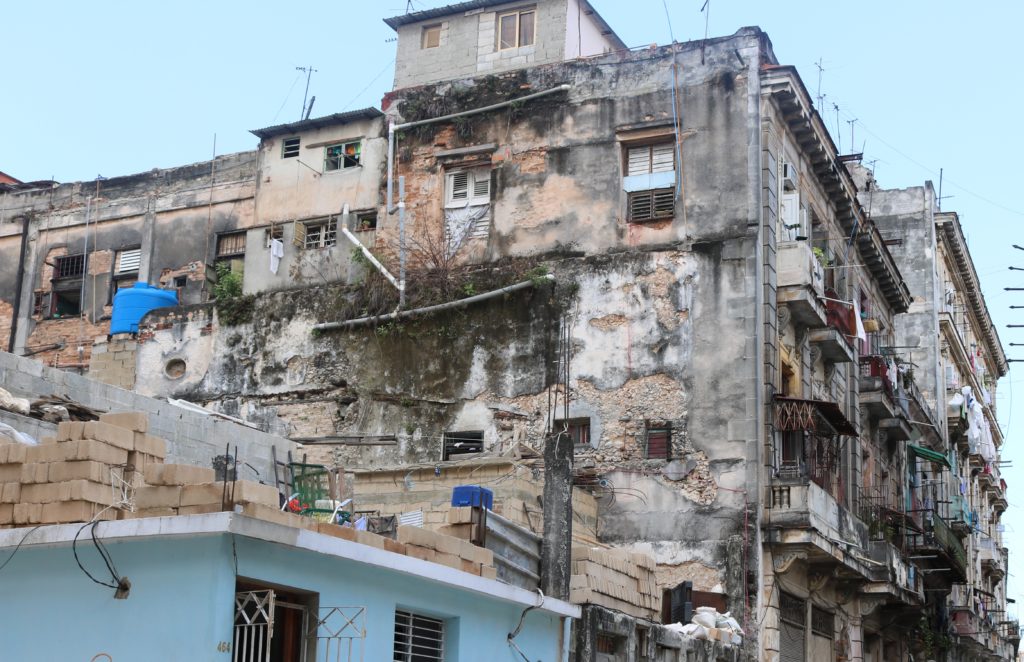Public Commentary / 13 April 2021
Colombia’s Shaky Peace Deal Needs Biden’s Support

BOGOTA, Colombia – In his last visit to Colombia as U.S. vice president in December 2016, Joe Biden praised then-President Juan Manuel Santos for the historic peace accord reached that year with the Revolutionary Armed Forces of Colombia—the country’s largest guerrilla group, better known as the FARC—which ended the longest-running armed conflict in the Western Hemisphere.
More than four years later, the Andean nation is at risk of losing most of the security gains from the hard-won peace agreement, with violence escalating to levels last seen before the peace talks. Now that Biden is back in office as president, he must pay attention to the factors derailing Colombia’s progress and work to straighten a long-term, bipartisan peace effort there.
Colombia’s 2016 peace deal was a badly needed dose of optimism for officials in Washington. After years of meticulous negotiations—and billions of dollars in U.S. foreign assistance—the deal generated an enthusiastic consensus in international bodies like the United Nations. But, despite the disarmament of the FARC, the implementation phase has been riddled with obstacles. The lack of effective state control in many regions of Colombia has facilitated the growth of armed groups and violent drug trafficking organizations, putting civilians at risk. To make matters worse, the COVID-19 pandemic is exacerbating already high rates of poverty and inequality in many of these areas.
As an important regional security partner for Colombia, the U.S. could now play a crucial role in pushing President Ivan Duque to use his last two years in office to make more progress on implementing the peace accord. Unlike Donald Trump, who did not care much about the peace process, Biden could convey to Bogota that his government is concerned by the recent setbacks, but is ready to back a bold and comprehensive approach to peacebuilding—the kind that was recently proposed by a coalition of American NGOs and think tanks. This means addressing security issues—beyond the war on drugs—from a human rights-oriented perspective; addressing Colombia’s high socioeconomic inequality and lack of political inclusion, problems that are most stark in rural areas; and providing robust support to the country’s existing transitional justice institutions.
Ally in War and Peace
It is easy to forget that Colombia—now a middle-income country and a member of the Organization for Economic Cooperation and Development—was on the brink of becoming a failed state by the late-1990s. The unchecked activities of drug cartels, as well as guerrilla and paramilitary groups, had led to unprecedented levels of violence. From Washington’s perspective, Colombia had become a destabilizing force in the region. In response, then-President Bill Clinton’s administration offered the Colombian government significant military aid through a deal known as Plan Colombia. Finalized in 2000, it was instrumental in modernizing Colombia’s armed forces and played a key role in shaping former President Alvaro Uribe’s security policy during the 2000s.
During his tenure, Uribe oversaw a military offensive that regained swaths of territory from the FARC and put the guerillas on the back foot. This was a crucial element that incentivized FARC leadership to seriously consider a peace settlement with Santos. Yet, Uribe’s security policy was tarnished by allegations of human rights violations committed by the armed forces during this time, including extrajudicial executions of civilians—crimes that are currently under investigation by the Special Jurisdiction for Peace, the transitional justice mechanism created by the peace deal.
By 2010, after a decade of sustained military pressure, national security officials in Bogota came to believe that if the government did not bring the FARC to the negotiating table soon, it ran the risk of prolonging the war indefinitely. Santos heeded this warning when he was elected as Uribe’s successor in 2010, and in 2012, his administration embarked on four years of painstaking negotiations with the FARC.
In this precarious moment for Colombia’s peace deal, the stakes are simply too high for Washington to shift its attention.
The primary objective of the talks was to secure the guerrilla group’s disarmament and reintegration into society, but they went far beyond that. The deal that was reached included provisions to promote greater political and socioeconomic inclusion of rural areas, tackle illegal drug trafficking, address the rights of victims of the conflict and ensure a durable peace. Ultimately, the peace process sought to consolidate Colombia’s long overdue nation-building project, not only by solidifying the state’s monopoly on the use of force, but also by enhancing the rights of all citizens and creating economic opportunities for marginalized communities.
Former U.S. President Barack Obama backed this transformative concept of peace from its inception, supporting Santos’ efforts to pursue exploratory talks with the FARC. Later in the process, in 2016, then-Secretary of State John Kerry traveled to Havana, where the talks were being held, for meetings with both sides and to express his support for the peace process. During Obama’s final year in office, the U.S. Congress approved a new assistance package known as Peace Colombia, signaling its backing of the agreement.
However, the Trump administration chose not to maintain this broad-based support for the peace process and instead refocused the U.S. relationship with Colombia back on the war on drugs. Trump even issued an extraordinary memo in September 2017 chastising Colombia for its “extraordinary growth of coca cultivation and cocaine production.”
The Way Ahead
Realizing the ambitious goals of the peace deal has been an extremely complex task, largely due to the divisive politics surrounding the accord. Uribe became a fierce critic of the peace process and led the campaign against ratification of the final agreement with the FARC in the referendum that was held in October 2016. Ultimately, a razor-thin majority of 50.2 percent voted against ratifying the agreement. The two sides quickly signed a revised accord, which was passed by congressional ratification in November 2016.
In the 2018 election, Duque won the presidency with Uribe’s backing, having campaigned against the peace accord. Since then, the Duque administration has sent mixed signals about its commitment to the peace accord’s implementation, fostering an uncertain political environment that has allowed spoilers of the process to seize the initiative.
The time is ripe for a greater U.S. role. Of course, Biden will be busy in Latin America. He faces a multitude of complex issues, including the exodus of migrants from Central America, the crisis in Venezuela and the question of whether to reengage with Cuba. But his administration stands to gain strategically from aiding Colombia’s peacebuilding efforts. It would advance his broader vision for a “secure, middle class and democratic hemisphere,” as Biden adviser Juan S. Gonzalez put it last June.
There are two areas where Biden could exercise diplomatic pressure on Duque, which are fundamentally two sides of the same coin: security and peace. Addressing one without the other would leave both unsolved.
On security, over the past three years, Colombia has seen a troubling spike in violent incidents against activists, human rights defenders and former combatants. Further, the power vacuum left by the FARC has been filled by other armed groups and criminal gangs rather than by the state. This is all the more worrisome considering that, since the peace deal was struck, Colombia’s armed forces seem to have gone astray. Corruption, human rights violations, internal chaos and a lack of strong civilian leadership are damaging their reputation and, more importantly, their capacity to protect citizens by responding to new forms of violence.
Biden should work to persuade the Colombian government to adopt an effective territorial security policy focused on protecting citizens, while conveying to Duque the importance of restoring the legitimacy, accountability and operational capacity of the armed forces. There is also ample room for the U.S. to provide financial and technical support for initiatives like the Colombian Police Unit for Peacebuilding and the National Commission of Security Guarantees, two key institutional mechanisms created during the peace process, but which the Duque administration has sidelined.
More generally, on peacebuilding, the U.S. should reassess its approach to the problem of coca production, which has long been based on forced eradication, either manually or by aerial fumigation. As a recent International Crisis Group report concludes, “four decades of targeted destruction of coca crops have had no lasting effect on drug supply.” Instead of continuing with this flawed strategy, Washington should treat illicit coca cultivation as a symptom of broader issues that need to be addressed, namely the lack of development and economic opportunities in Colombia’s peripheral regions. This approach mirrors the more holistic strategy outlined in the Biden administration’s recently released white paper on drug policy priorities.
Despite some scattershot efforts from various Colombian officials, the institutions that are in charge of implementing the peace deal have yet to fully grasp the state-building logic that was carefully laid out in the text of the agreement. In a country with tremendous regional disparities, the best way to strengthen the legitimacy of the state in conflict-ridden areas is to improve public services, heighten citizen participation in public affairs, augment economic opportunities for rural communities and foster reintegration and reconciliation of former combatants. Here, the U.S. government should continue and increase its support for Colombian programs to expand land rights and road infrastructure that are vital in boosting economic development.
In a call in January with his Colombian counterpart, Secretary of State Antony Blinken signaled that the U.S. “will partner closely with the Colombian government as it extends the benefits of peace throughout the country.” This suggests the Biden administration is already moving in the right direction; it must continue to do so by setting high expectations for Bogota and using its leverage to ensure they are met. In this precarious moment, the stakes are simply too high for Washington to shift its attention.
Originally published in World Politics Review.







